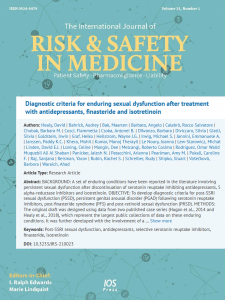Editorial in leading journal, meanwhile, criticizes FDA for not making Merck conduct new safety studies when persistent ED signal emerged
Nov. 20, 2021
Dear Friends:
 A decade after the first peer-reviewed article on persistent adverse sexual effects in finasteride patients appeared in medical literature, the first-ever diagnostic criteria for PFS has followed suit.
A decade after the first peer-reviewed article on persistent adverse sexual effects in finasteride patients appeared in medical literature, the first-ever diagnostic criteria for PFS has followed suit.
To access our PFS Diagnostic Criteria page, click here. To access our complete list of reported PFS symptoms, click here.
Titled Diagnostic criteria for enduring sexual dysfunction after treatment with antidepressants, finasteride and isotretinoin, the research was published in the International Journal of Risk & Safety in Medicine.
David Healy, MD, a professor of psychiatry at McMaster University, led a multidisciplinary team of 36 doctors and researchers from 21 institutions in developing the criteria. Among them are Michael S. Irwig, MD, Harvard Medical School, Mohit Khera, MD, Baylor College of Medicine, Roberto Cosimo Melcangi, PhD, University of Milan, Barbara M. Chubak, MD, Icahn School of Medicine at Mount Sinai, Paddy K.C. Janssen, PharmD, Maastricht University Medical Centre and Wayne J.G. Hellstrom, MD, Tulane University School of Medicine.
Dr. Healy concludes:
We hope these criteria will lead to increased awareness of the conditions, more accurate diagnoses, and greater research efforts into treatment options for those affected… It is hoped they will ultimately be replaced by diagnostic markers, whether genetic, electrophysiological, endocrine or other.
Separately, Dr. Irwig has published an editorial examining how finasteride’s potential to induce persistent erectile dysfunction in a subset of men has gone unchecked for more than a decade after regulatory officials noted the signal in post-marketing data.
Titled How routine pharmacovigilance failed to identify finasteride’s persistent sexual side effects, the article appears in Andrology.
 Chief among Dr. Irwig’s source material were (a) documents ordered unsealed by Judge Peggy Kuo in January 2021 in response to Reuters America LLC’s motion to unseal in the US Propecia litigation and (b) documents in the same litigation released voluntarily to the public in October 2020 by defendants Merck & Co. and Merck Sharp & Dohme.
Chief among Dr. Irwig’s source material were (a) documents ordered unsealed by Judge Peggy Kuo in January 2021 in response to Reuters America LLC’s motion to unseal in the US Propecia litigation and (b) documents in the same litigation released voluntarily to the public in October 2020 by defendants Merck & Co. and Merck Sharp & Dohme.
He writes:
When confronted with data that their product could cause persistent erectile dysfunction, the Risk Management Safety Team at Merck, in 2009, had the opportunity to take further action to sort out the issue. Realizing that many adverse event reports lacked adequate information, the team could have recommended conducting additional rigorous prospective studies on finasteride to obtain needed information… Instead of seeking out the truth regarding a serious and life-altering adverse effect, the [team’s] planned action was routine pharmacovigilance for another two years. It is difficult to justify this decision since routine pharmacovigilance was unable to provide adequate information on hundreds of cases from 1998 to 2008. The FDA also bears some responsibility as it did not advise or require Merck to conduct additional safety studies to adequately address the signal of persistent erectile dysfunction.
And he concludes:
[P]rescribers of finasteride and male patients with androgenetic alopecia deserve to know how an opportunity was lost to seek the truth regarding this medication’s persistent sexual side effects.
To access the documents unsealed and released in the US Propecia litigation, please visit our Propecia Litigation Library.
 Anyone living in the US who suffers from PFS should report his/her symptoms to the US Food and Drug Administration. Anyone living outside the US who suffers from PFS should report his/her symptoms to the US Food and Drug Administration as well as to his/her national drug-regulatory agency, as directed on our Report Your Side Effects page.
Anyone living in the US who suffers from PFS should report his/her symptoms to the US Food and Drug Administration. Anyone living outside the US who suffers from PFS should report his/her symptoms to the US Food and Drug Administration as well as to his/her national drug-regulatory agency, as directed on our Report Your Side Effects page.
If you or a loved one are suffering from PFS, and feeling depressed or unstable, do not hesitate to contact the PFS Foundation via our Patient Support hotline: social@pfsfoundation.org. Thank you.
Thank you.
Related News
